The Christian Cross Is Pagan!
(By Crystal Holmes)
That the cross is a Christian symbol is accepted without question by practically every professing Christian. It is revered and all but worshiped by nearly everyone. But no one ever stops to wonder why they reverence the cross. No one asks where the practice originated, or wonders if they should wear crosses around their necks and have them scattered around their homes. Everyone just takes it for granted that this is what Jesus wants us to do. But is it? Does the Bible encourage that practice? For that matter, did Jesus even die on a cross? What does the Bible say?
DID JESUS DIE ON A CROSS?
The word “cross” in your Bible is translated from the Greek word “stauros”. So when you read the phrase “the cross of Christ” in your Bible, the original phrase is “the stauros of Christ”. What does that phrase mean – is “the stauros of Christ” a T-shaped cross like we are familiar with today… or was it something else?
“Both the noun and the verb stauroo, ‘to fasten to a stake or pale,’ are originally to be distinguished from the ecclesiastical form of a two beamed ‘cross.’ The shape of the latter had its origin in ancient Chaldea, and was used as the symbol of the god Tammuz… the Tau or T, in its most frequent form, with the cross-piece lowered, was adopted to stand for the ‘cross’ of Christ.” (Vine)
So according to this respected authority, the original instrument of Jesus’ death is DIFFERENT from the popular image of the two-beamed cross shaped like a T! In fact, the cross is a symbol of one of the enemies of God – Tammuz, a Babylonian sun-god. The ancient letter Tau, the initial of Tammuz, looks like the English lower-case ‘t’, which makes a very clear cross. It was this cross that was brought by pagans into the church and was later ADOPTED to stand for the “cross” of Christ. According to that quote, the Tau cross revered by so many today had its origin in ancient Chaldea – Babylon!
“What the ancients used to signify when they used the word stauros, can easily be seen by referring to either the Iliad or the Odyssey. It will there be found to clearly signify an ordinary pole or stake without any cross-bar. And it is as thus signifying a single piece of wood that the word in question is used throughout the old Greek classics.” (Parsons)
So when the classical Greek writers used the word stauroo or stauros, they never meant a T-shaped cross, but rather a simple pole – a straight piece of wood or stake WITHOUT A CROSS BAR!
“The side light thrown upon the question by Lucian is also worth noting. This writer, referring to Jesus, alludes to ‘That sophist of theirs who was fastened to a skolops’ which word signified a single piece of wood, and not two pieces joined together.” (Parsons)
The ancient historians agree that the instrument of Jesus’ death was a single piece of wood, an upright pole or stake. THIS is the instrument Jesus died upon – NOT the two-beamed cross seen in every church! This is why Peter says that Jesus “bare our sins in his own body on the tree” (1 Peter 2:24), a strange statement if Jesus was nailed to a two-beamed cross, but fitting perfectly with the true meaning of the Greek word stauros – a single pole!
Another Biblical picture of what the so-called “cross” looked like is revealed in
John 3:14. And as Moses lifted up the serpent in the wilderness, even so must the Son of man be lifted up.
So Jesus was to be lifted up in the same fashion as Moses lifted up the brass serpent. What was that brass serpent lifted up on? Was it a cross?
Numbers 21:9. And Moses made a serpent of brass, and put it upon a pole…
And in the exact same way, Jesus was lifted up – not on a cross, but on a stauros… a POLE or STAKE!
THE MANY FORMS OF THE CROSS
The cross takes many forms today. All denominations, including completely non-Christian religions, have their own preferred form. Surely, Jesus died only once; even if it were on a cross, it could only have been on one type of cross; so what do all these other crosses represent? Surely Jesus wasn’t crucified on an Eastern Orthodox or a Maltese cross; so why do Christians revere them today?
“In their temples, in their houses, on their images, etc., the worshippers [of pagan gods] were accustomed to see the peculiar Cross, or Crosses, dedicated to each [individual deity]. Bacchus had his, Serapis his, and so forth.” (Brock)
In ancient times, each false god had his own cross. And just like ancient times, each Catholic saint, in addition to the Pope and Mary, has his own form of the cross. These crosses don’t commemorate Jesus! They were devoted to Catholic saints!
Surely, Jesus could not have died on ALL of the crosses you see in modern Christianity! He died only once and on one specific instrument, but no one seems to care which of these forms you wear around your neck! None of those crosses commemorate Christ because Christ died on a stake! Instead, they all commemorate ancient false gods!
THE ANTIQUITY OF THE CROSS
The Catholic Encyclopedia admits that “the sign of the cross, represented in its simplest form by a crossing of two lines at right angles, greatly antedates, in both the East and the West, the introduction of Christianity. It goes back to a very remote period of human civilization.”
The Catholic Church – which is THE authority on the history of mainstream Christianity – admits that the very symbol of their religion antedates the founding of their religion.
“Only, do not let the Christians be selfish, and in their use of it exclude the Heathen, as the Heathen had the Cross at any rate 1,000 years before them.” (Brock)
So what exactly did the cross that was revered by ancient pagans at least 1,000 years before the birth of Christ look like?
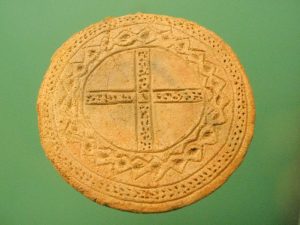
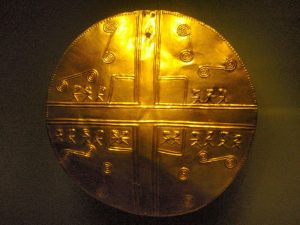 Pre-Columbian crosses found in Colombia. Both of these artifacts picture a cross superimposed on the sun! This is very likely what Emperor Constantine saw in his vision.
Pre-Columbian crosses found in Colombia. Both of these artifacts picture a cross superimposed on the sun! This is very likely what Emperor Constantine saw in his vision.
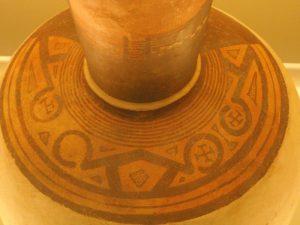 Pre-Columbian swastikas found on a clay vase from Colombia. To the Hindus and other cultures, the swastika was used to represent the sun, life, power, strength, good luck, etc.
Pre-Columbian swastikas found on a clay vase from Colombia. To the Hindus and other cultures, the swastika was used to represent the sun, life, power, strength, good luck, etc.

 Hieroglyphs in an ancient Ptolemaic Egyptian frieze. The Ptolemaic period extends from 305 to 30 B.C., so obviously this cross cannot possibly commemorate Christ. The enlargement on the right shows that it is exactly like the Latin cross so commonly seen today.
Hieroglyphs in an ancient Ptolemaic Egyptian frieze. The Ptolemaic period extends from 305 to 30 B.C., so obviously this cross cannot possibly commemorate Christ. The enlargement on the right shows that it is exactly like the Latin cross so commonly seen today.
 Latin-styled cross on the head of a bull. From Belarus, dated 400 to 300 B.C.
Latin-styled cross on the head of a bull. From Belarus, dated 400 to 300 B.C.

 Latin-styled cross and Greek (mathematician’s) crosses from Belarus, dated between 700 and 500 B.C.
Latin-styled cross and Greek (mathematician’s) crosses from Belarus, dated between 700 and 500 B.C.
 Etruscan pendant with swastika symbols. From Italy, dated between 700 and 650 B.C.
Etruscan pendant with swastika symbols. From Italy, dated between 700 and 650 B.C.

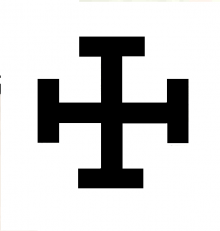 Symbol of the Chinese wu (“shaman; witch, wizard; magician”). These figurines, which are dated circa 8th century BC, were worn on the top of the head, identifying the person as a wu. Note the connection between this symbol for “shaman” (a cross with potents) with the Western heraldic symbol of magicians, the cross potent (picture on the right).
Symbol of the Chinese wu (“shaman; witch, wizard; magician”). These figurines, which are dated circa 8th century BC, were worn on the top of the head, identifying the person as a wu. Note the connection between this symbol for “shaman” (a cross with potents) with the Western heraldic symbol of magicians, the cross potent (picture on the right).
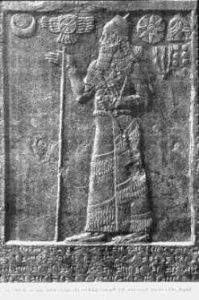
 Assurnasiripal II from ancient Nimrud; he reigned from 883 to 859 B.C. Above his rod is a “ring with wings” or “winged disk” which has a Maltese cross in the middle of it. The cross was associated with the sun, and more specifically, the total eclipse of the sun.
Assurnasiripal II from ancient Nimrud; he reigned from 883 to 859 B.C. Above his rod is a “ring with wings” or “winged disk” which has a Maltese cross in the middle of it. The cross was associated with the sun, and more specifically, the total eclipse of the sun.
 Maltese cross on a necklace worn by the Assyrian king Shamshi-Adad V. This stele is dated 824 B.C. What we now call the Maltese cross was very prominent during the Assyrian period.
Maltese cross on a necklace worn by the Assyrian king Shamshi-Adad V. This stele is dated 824 B.C. What we now call the Maltese cross was very prominent during the Assyrian period.
 A tablet from around 900 B.C. depicting the Babylonian sun-god Shamash (seated on the right) holding emblems of his authority, a staff and ring, and the king with two attendants on the left. In the center, on an altar, is a large 4-point sun image, with additional small wavy rays between the points.
A tablet from around 900 B.C. depicting the Babylonian sun-god Shamash (seated on the right) holding emblems of his authority, a staff and ring, and the king with two attendants on the left. In the center, on an altar, is a large 4-point sun image, with additional small wavy rays between the points.
 An artifact unearthed in the holy of holies of the pagan temple in the Canaanite city of Hazor (also spelled Hatzor), in northern Israel, that dates to 1,400 B.C. It is described as follows: “a basalt offering table, pillar-shaped, with a carved symbol of the storm god Baal on its side. That symbol was a circle with a cross in the center”. The symbol of Baal was the circle with a cross in the center!! Notice that this artifact’s design matches perfectly the first two images you saw of a cross superimposed on a sun!
An artifact unearthed in the holy of holies of the pagan temple in the Canaanite city of Hazor (also spelled Hatzor), in northern Israel, that dates to 1,400 B.C. It is described as follows: “a basalt offering table, pillar-shaped, with a carved symbol of the storm god Baal on its side. That symbol was a circle with a cross in the center”. The symbol of Baal was the circle with a cross in the center!! Notice that this artifact’s design matches perfectly the first two images you saw of a cross superimposed on a sun!
 From Estonia, dated to be from the Iron Age. Regardless of the dates of the Iron Age, it can safely be said that they are pre-Christian crosses.
From Estonia, dated to be from the Iron Age. Regardless of the dates of the Iron Age, it can safely be said that they are pre-Christian crosses.
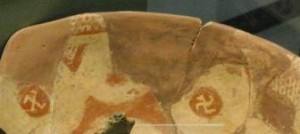 From Bulgaria, dated to the Neolithic Age. Regardless of the exact dates of the Neolithic Age, the pottery here is definitely pre-Christian.
From Bulgaria, dated to the Neolithic Age. Regardless of the exact dates of the Neolithic Age, the pottery here is definitely pre-Christian.
 Found in northern Afghanistan, dated to be between 2,000 and 1,500 B.C. Again, this is a cross inscribed in a circle (which represents the sun).
Found in northern Afghanistan, dated to be between 2,000 and 1,500 B.C. Again, this is a cross inscribed in a circle (which represents the sun).
 Ritual vessel from Egypt during the First Dynasty, circa 3,000 B.C. This is a representation of the ankh, a sign of life, power, strength, and good luck to the Egyptians. The ankh is acknowledged by most historians to be a precursor to the so-called “Christian” cross, which as you’re starting to see, has nothing whatsoever to do with Christ!
Ritual vessel from Egypt during the First Dynasty, circa 3,000 B.C. This is a representation of the ankh, a sign of life, power, strength, and good luck to the Egyptians. The ankh is acknowledged by most historians to be a precursor to the so-called “Christian” cross, which as you’re starting to see, has nothing whatsoever to do with Christ!
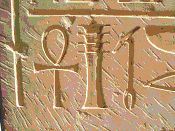
 The Djed pillar (middle symbol in the left image) is “one of the more ancient and commonly found symbols in Egyptian mythology. It is a pillar-like symbol in hieroglyphics representing stability [or power, strength]. It is associated with Osiris [i.e., Nimrod], the Egyptian god of the afterlife, the underworld, and the dead. It is commonly understood to represent his spine” (Wikipedia, “Djed”). The Djed was often used in representations with the Pharaohs as staffs and head dresses. Here it is shown in a representation of Nimrod (note the leopard print dress and Negroid facial features). The Djed could be the earliest form of the cross, since Babel was constructed under Nimrod circa 2,200 B.C.
The Djed pillar (middle symbol in the left image) is “one of the more ancient and commonly found symbols in Egyptian mythology. It is a pillar-like symbol in hieroglyphics representing stability [or power, strength]. It is associated with Osiris [i.e., Nimrod], the Egyptian god of the afterlife, the underworld, and the dead. It is commonly understood to represent his spine” (Wikipedia, “Djed”). The Djed was often used in representations with the Pharaohs as staffs and head dresses. Here it is shown in a representation of Nimrod (note the leopard print dress and Negroid facial features). The Djed could be the earliest form of the cross, since Babel was constructed under Nimrod circa 2,200 B.C.
Historians all agree that these crosses have a common origin. They are all signs of life, rebirth, or the death of that pagan religion’s messiah. They all predate Christ, being used at least 15 centuries before Christ! Then the Catholic Church adopted them, simply renaming these common pagan idols and calling them Christian symbols, and treating them in the same manner as the heathens had treated them under the old names.
WHAT DOES THE CROSS MEAN?
To non-Christian people, the cross does not symbolize the death of Christ. To them it symbolizes something entirely different: it is a sign of life to them. The cross is a type of fertility symbol, representing not only physical life but also a “future life”.
“The cross represents the Tree of Life, the age-old fertility symbol, combining the vertical male and horizontal female principles, especially in Egypt….” (Koster)
The cross is a fertility symbol, well-known in ancient Egypt and in other cultures. The cross is found even in the “cradle of European civilization”:
“Leaving the land of Shem and passing to the tents of Japhet, we are welcomed at the very cradle of European art and civilization [Greece] by the cross. It may have been brought with other traditions by those who wandered into Greece after the dispersion of Babel, or it may have been transmitted from Egypt, or Phoenicia, but the same promise of ‘future life’ was symbolized.” (Seymour)
The cross, regardless of its form, “is an emblem of great antiquity, and it is sometimes called ‘the sign of life.’” (Maurice)
The cross is a sign of life throughout the world, and everywhere it is used as a charm, to ward off “evil” spirits.
“The sign of the cross has been a symbol of great antiquity, present in nearly every known culture. Its meaning has eluded anthropologists, though its use in funerary art could well point to a defense against evil.” (Snyder)
The pagan historian Cicero wrote a tract defending a victim condemned to death by a cross; he considered the cross such a vile instrument of execution, that the very word “cross” should not be mentioned by decent people!
“…the very word ‘cross’ should be far removed not only from the person of a Roman citizen but from his thoughts, his eyes and his ears. For it is not only the actual occurrence of these things or the endurance of them, but… the mere mention of them, that is unworthy of a Roman citizen and a free man.” (Cicero)
So how can billions of Christians exalt this instrument of horrible torture as a sign of life? The only person it truly honors is the person who murdered Christ – Satan the devil. This is the symbol of his one and only success over God… or so he thinks.
“In Heathen China, as in Christian Europe, [the cross] is used as a charm.” (Brock)
The Christians interpreted it as a defense against evil – a purpose for which this symbol had already been used for thousands of years by the enemies of God. To them it was a lucky charm – no different than a rabbit’s foot, four-leaf clover, or horseshoe – for warding off evil spirits. These people were full of superstitions! And they brought those superstitions into Christianity with them!
“Over and over again, Christians who sign themselves with the sign of the Cross, prove to be victorious over the evil one, and the evil pseudo-powers which still operate in our broken and divided world, under the attack of the evil one. Whenever and wherever you feel the presence of evil, just sign yourself with the sign of the Cross: the pseudo-power of evil will disappear on the spot.” (The Illuminator)
 Brock says that the cross was interpreted and used in Christian Europe JUST LIKE it was in heathen China! There was NO DIFFERENCE in how it was used between these two continents! In both places, by heathen people and by supposedly “Christian” people, it was used as a charm to ward off evil. Priests today hold out the cross during exorcism to make the evil spirit leave, just as you see in horror films people forming a cross using both index fingers to signify to their attacker, “Stay away! Don’t harm me!”
Brock says that the cross was interpreted and used in Christian Europe JUST LIKE it was in heathen China! There was NO DIFFERENCE in how it was used between these two continents! In both places, by heathen people and by supposedly “Christian” people, it was used as a charm to ward off evil. Priests today hold out the cross during exorcism to make the evil spirit leave, just as you see in horror films people forming a cross using both index fingers to signify to their attacker, “Stay away! Don’t harm me!”
“[The sign of the cross], referred to as theirs by the Christian writers of the second and third centuries, is said to have had a place before our era in the rites of those who worshiped Mithras, if not also of those who worshiped certain other conceptions of the Sun-God….” (Parsons)
The sign of the cross comes from antiquity when people worshiped the Persian sun-god Mithras and other sun-gods. Even then it was used to ward off unwanted spirits and defend against evil of all kinds.
The Encyclopaedia of Religion and Ethics says, “With the 4th century magical belief began to take a firmer hold within the Church.” As with a magic charm, simply making the sign of the cross was thought to be “the surest defence against demons, and the remedy for all diseases”. Superstitious use of the cross continues to this day. How many times have I seen people cross themselves multiple times when walking past a church or a monument of a saint or when simply driving on a dangerous road!
“The salutary trophy of Jesus, the cross, which to this day heals diseases, to this day drives away devils, overthrows juggleries of drugs and charms.” (Cyril)
This really is not the trophy of Jesus, but it is the trophy of Satan! Further proof of its pagan origin is the recorded evidence of the Vestal Virgins (Koster) of pagan Rome having the cross hanging on a necklace, and the Egyptians doing it too, as early as the 15th century B.C.! The Buddhists, and numerous other sects of India, also used the sign of the cross as a mark on their followers’ heads.
 “The Shari were another Eastern or Northern people, against whom the Egyptians waged a successful war, principally in the reigns of Osirei and his son, the great Rameses [born circa 1,300 B.C.]…. They frequently had a small cross suspended to a necklace, or to the collar of their dress. The adoption of this last was not peculiar to them; it was also appended to, or figured upon, the robes of the Rot-n-no; and traces of it may be seen in the fancy ornaments of the Rebo, showing that it was already in use as early as the 15th century before the Christian Era.” (Wilkinson)
“The Shari were another Eastern or Northern people, against whom the Egyptians waged a successful war, principally in the reigns of Osirei and his son, the great Rameses [born circa 1,300 B.C.]…. They frequently had a small cross suspended to a necklace, or to the collar of their dress. The adoption of this last was not peculiar to them; it was also appended to, or figured upon, the robes of the Rot-n-no; and traces of it may be seen in the fancy ornaments of the Rebo, showing that it was already in use as early as the 15th century before the Christian Era.” (Wilkinson)
FIFTEEN CENTURIES BEFORE CHRIST!! The cross cannot represent Christ because it existed before He lived on Earth! If a company today registers a logo, it is theirs. It represents them. Anyone who sports it supports that company’s work and ideals. If another company tries to use it, they will be charged with plagiarism, which is theft! That logo can NEVER represent the second company, because it was already registered and used by the first. It is THEIR accepted and recognized symbol. Its meaning CANNOT be transferred to another company!
Similarly, the cross was a pagan symbol, used LONG before Christ, to represent the sun-god, life, power, etc. It was used by pagans in their rituals which God hates, used to honor false gods whom God considers ABOMINATIONS. It has ALWAYS represented these things, and people who try to use it to represent Christ are falling into the same trap that Ancient Israel fell into – revering the symbols of pagan gods just because it was the “popular” thing to do! And anyone who learns this and doesn’t change will be treated just as God has always treated idolators.
THE CROSS IS AN IDOL!
“The cross was widely known in pre-Christian times as an emblem that was a well-known Heathen Sign.” (Unger’s Bible Dictionary)
Would God want you to use this “well-known heathen sign” to remember Him? This symbol that commemorates Tammuz, Chronos, Bacchus, and other sun-gods? Think about it! Would HE want to be in the same category as these false gods?
Deuteronomy 12:30-31 (BBE). After their destruction take care that you do not go in their ways, and that you do not give thought to their gods, saying, How did these nations give worship to their gods? I will do as they did. Do not so to the Lord your God: for everything which is disgusting to the Lord and hated by him they have done in honour of their gods: even burning their sons and daughters in the fire to their gods.
God said NOT to do as the heathen do! He wants people to worship Him in a DIFFERENT way! He commanded you NOT to learn the way of the heathen (Jeremiah 10:2), but instead to LEARN the difference between the holy and the unholy, between the clean and the unclean, between Him and false gods!
Ezekiel 44:23 (BBE). And they [the priests] are to make clear to my people the division between what is holy and what is common, and to give them the knowledge of what is clean and what is unclean.
God does not want you to follow the heathen or worship Him the way they worship their gods. The heathen have made images of their gods, and God says that He HATES that! You have seen many proofs in this article that the cross is an idol! It has always been one, and even though it has been renamed,it is still an image of a false god and a false religion!
“What is now called the Christian religion has existed among the ancients, and was not absent from the beginning of the human race until Christ came in the flesh, from which time the true religion, which existed already, began to be called Christian.” (St. Augustine)
Read that again! What St. Augustine called the true religion, which existed ALREADY, began to be called Christian after Christ came in the flesh!! Modern Christianity is simply a RENAMING or RELABELING of an ancient pagan religion! This is Satan’s best trick – he perverts the truth and puts God’s name on it to give it credibility so people will be deceived and believe lies. But it’s time YOU learned the truth!
Think about that. If you took a sun-worshiping temple with its priests who were performing human sacrifices, and painted them white, put a cross on top, and called them Christian, would it make them Christian? What about taking the devil and painting him white so that he looked like Christ – would that make him Christ? Would that make him even the least bit righteous? NO! Of course not! The devil by any other name or image is still the devil. Even so, a pagan church by any other name is still a pagan church, and a pagan idol is still a pagan idol even if you call it the cross of Christ!
What Augustine called “the true religion” – the religion from which all religions (except the religion of the Bible) have descended – is the worship of the sun-god. And this religion has been in existence since the beginning of the human race. Modern Christianity has adopted this religion and its practices, often changing them no more than by replacing the pagan names with Christian-sounding names, but the true God is not the center of this religion!
 “The cross thus widely worshiped, or regarded as a ‘sacred emblem’ [by Modern Christianity], was the unequivocal symbol of Bacchus, the Babylonian Messiah, for he was represented with a head-band covered with crosses.” (Seymour)
“The cross thus widely worshiped, or regarded as a ‘sacred emblem’ [by Modern Christianity], was the unequivocal symbol of Bacchus, the Babylonian Messiah, for he was represented with a head-band covered with crosses.” (Seymour)
Bacchus is simply another name for Tammuz. Bacchus is the Greek name, and Tammuz is the Tyrian or Canaanite name. Each culture has its own name for him.
“The symbol for Tammuz is what the mystery religions call the mystic ‘T.’” (Maurice)
Tammuz was supposedly a resurrected sun-god. “Tammuz… in Mesopotamian religion, god of fertility embodying the powers for new life in nature in the spring.” (Encyclopedia Britannica)
Thus, adoring the cross is worshiping fertility gods. And if you have a cross, you are telling God that you would rather worship the gods of fertility than the True God who made the earth and seas and all that is in them! Plain and simple – having a cross is honoring Tammuz!
Ezekiel 8:14-15 (BBE). Then he took me to the door of the way into the Lord’s house [or, temple] looking to the north; and there women were seated weeping for Tammuz. Then he said to me, ‘Have you seen this, O son of man? you will see even more disgusting things [abominations] than these.’
This Tammuz, whose sign is the T, is revered by mainstream Christians today! They have his sign in their Churches and homes, on their Bibles, on their clothing, and around their necks! They carry Tammuz’s sign everywhere with them! AND GOD CALLS IT AN ABOMINATION! It doesn’t matter if this cross has been in your family for generations; IT IS STILL AN ABOMINATION!! It doesn’t matter if you wear it to honor Christ even though it’s a pagan symbol; IT IS STILL AN ABOMINATION!! No matter what your reason for keeping it in your home – IT IS STILL AN ABOMINATION!!
Luke 6:46. And why call ye me, Lord, Lord, and do not the things which I say?
If you truly desire to follow God and worship Him in a way that He finds pleasing, you cannot be following the customs of the heathen (Jeremiah 10:2)! Jesus said you are to learn OF HIM (Matthew 11:29), NOT from the people! If you don’t learn from Jesus, then you don’t have the spirit of Christ, and YOU ARE NONE OF HIS (Romans 8:9)!!
“In the Egyptian churches the cross was a pagan symbol of life borrowed by the Christians and interpreted in the pagan manner.” (Encyclopedia Britannica)
Notice this was a pagan symbol borrowed by the Christians and interpreted in the same pagan manner! They understood that it was a pagan symbol – and revered it as such! They completely ignored God’s commandment not to worship Him like the heathen gods were worshiped! They chose to disobey God’s commandment and continue in their rebellion against Him! And this sign is seen today in every so-called Christian Church – be it Catholic or Protestant! And if you own or revere the sign of the cross, you are worshiping God like He is a heathen god – in direct rebellion against the God you claim to serve!
APPENDIX. THE CHI-RHO
The chi-rho cross is a little unique among the forms of the cross because it is the so-called “monogram of Christ” being the first two letters of the Greek word for Christ. It is also called the Labarum in some works.
 The chi-rho is an ancient symbol, used millenia before Christ. A few centuries before Christ, it was used by Egyptian King Ptolemy III, who reigned from 246 to 222 B.C. (See the picture at right with the Chi-Rho between the eagle’s legs).
The chi-rho is an ancient symbol, used millenia before Christ. A few centuries before Christ, it was used by Egyptian King Ptolemy III, who reigned from 246 to 222 B.C. (See the picture at right with the Chi-Rho between the eagle’s legs).
“The Chi-Rho, as a symbol, was in use long before Biblical Christianity entered the scene. The ‘X’ (Chi) represented the Great Fire or Sun and the P (Rho) was for Patah or Pater (Father)…. It is a composition of X and P (Chi and Rho), which means ‘Sun’ or ‘Fire’ and ‘Father’, rendering, ‘Father Sun’ or ‘Great Father Sun’.” (letusreason)
The chi rho cross was a pre-Christian symbol, the name and meaning of which points to a pagan sun-god! It was used by several solar deities as their symbol, but specifically, the Babylonians used it as an emblem of their sky-god, as Cooper states:
“The labarum was also an emblem of the Chaldean (Babylonian) sky-god and in Christianity it was adopted…” (Cooper)
Notice! Christianity ADOPTED this symbol. That means it was already in use, and it represented another god! Usually when someone borrows a name or a symbol, it is because they already agree with and support what that name or symbol represents. People who wear pink ribbons, for example, are showing that they support “The Cure”. A bumper sticker for a sporting goods store shows that the car owner likes what that store sells.
Similarly, Christianity adopted this symbol because they already agreed with the paganism behind the symbol. They had already “bought” the lies paganism offered. They had already rejected the true God, and were supporting Tammuz, so it was only natural that they wear his symbol, too.
Egyptologist Sir Flinders Petrie said that the chi-rho was the emblem of the Egyptian god Horus thousands of years before Christ.
“An identical symbol to the Chi-Rho has been found inscribed on rocks dating from 2,500 B.C. Sumeria, and was interpreted as ‘a combination of the two Sun-symbols’ – symbols of the ancient shining ones.” (Gardiner)
The chi-rho, despite what people claim, has been used thousands of years before Christ to honor sun-gods of many cultures. It has been used to signify “good fortune”, and interestingly, before its adoption by Christianity, it was known as the monogram of Chronos! NOT the monogram of Christ!
“Before it became the monogram of Christ, the chi rho was the monogram of Chronos (whose name also begins with a Chi-rho in the Greek spelling), the god of time, and an emblem of several solar deities…. The chi rho was used in hermetic alchemical texts to denote time.” (Emick)
Calling it the “monogram of Christ” is a lie, for it NEVER was the monogram of the true Christ!
BIBLIOGRAPHY
- St. Augustine. Retractationes. I, 13.
- Brock, Mourant. The Cross: Heathen and Christian. 1879.
- Bullinger, Dr. E. W. The Companion Bible.
- Cicero. “Speech before Roman Citizens on Behalf of Gaius Rabirius, Defendant Against the Charge of Treason.” Translated by William Blake Tyrrell. Section 16.
- Cooper, J. C. An Illustrated Encyclopedia of Traditional Symbols. 1987.
- Cyril. Catechetical Lectures. Pages 162-164.
- “Djed”. Wikipedia. Accessed January 2013. http://en.wikipedia.org/wiki/Djed
- Emick, Jennifer. “Chi-Rho”. Accessed October 2011. http://symboldictionary.net/?p=2043
- Encyclopedia Britannica. 11th Edition. Volume 14. Pages 273, 532.
- Gardiner, Philip. “The Skull and Crossbones: The Untold Story of the Templar Shining Ones.” Accessed October 2011. http://www.bibliotecapleyades.net/sociopolitica/sociopol_masonsknightstemplar06.htm
- Hastings, James. The Encyclopaedia of Religion and Ethics. 12 volumes. 1908-1927.
- “The Illuminator: The Newspaper of the Greek Orthodox Metropolis of Pittsburg”. June-September 2004. Volume 25. Number 130. Page 1.
- Koster, C. J. Come Out Of Her My People. 2004.
- letusreason. “The Christian Cross?” Accessed October 2011. http://thechristiancross.blogspot.com/
- Maurice, Thomas. “The Indian Antiquities”. 7 volumes. 1793-1800.
- “Oahspe Study: What is the Origin of Christ?” Accessed October 2011.
- http://oahspestandardedition.com/OSAC/What_is_the_Origin_of_Christ.html
- Parsons, John Denham. The Non-Christian Cross: An Enquiry Into the Origin and History of The Symbol Eventually Adopted as That of Our Religion. 1896.
- Seymour, William Wood. The Cross in Tradition, History, and Art. 1898.
- Smith, William, Dr. Smith’s Bible Dictionary. “Cross”. 1868.
- Snyder, Graydon. Archaeological Evidence of Church Life Before Constantine. 1985.
- Vine, W.E. Vine’s Expository Dictionary of New Testament Words. “Cross, Crucify”.
- Ward, Henry Dana. History of the Cross: The Pagan Origin and Idolatrous Adoption and Worship of the Image. 1871.
- Wilkinson, John Gardiner. Manners and Customs of the Ancient Egyptians. First Series. Volume 1. Pages 375-376. 1837.
- “Wu (shaman)”. Wikipedia. Accessed December 2012. http://en.wikipedia.org/wiki/Wu_(shaman)
